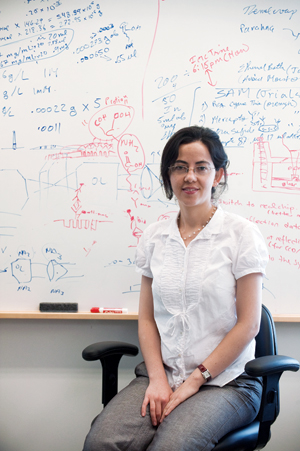Professor Studies Proteins Using Nanotechnology
ENG’s Hatice Altug receives NSF CAREER award

Hatice Altug, a College of Engineering assistant professor of electrical and computer engineering, received a National Science Foundation Early Career Development award at the end of January for her work using nanotechnology to conduct a large-scale study of proteins.
By tracking light flow in tiny, protein-coated metallic structures called nanoparticles, Altug can detect and quantify proteins and study the way they interact.
“If you think of light as wild horses that run around,” she explains, “nanostructures grab them and manipulate them to flow in a different direction than they normally do.”
The way these 100-nanometer-sized particles grab and throw light reveals important characteristics about the proteins coating them, says Altug.
To study proteins is to decipher the code of life’s building blocks and better understand how cells function. Altug hopes to find more and diverse ways of studying proteins. Better diagnostic tools could be developed to detect diseases, such as Alzheimer’s or cancer, at a much earlier stage. As she explains, high concentrations of certain proteins in the blood could indicate that a cell’s metabolism is changing because of the onset of cancer.
Altug, who holds a Peter Paul Career Development Professorship, endowed by Peter T. Paul (GSM’71), plans to use her five-year, $400,000 NSF award to continue exploring new designs and fabrication techniques for detecting proteins. Some funds will be used to support students working in her lab.
With education a key element of every NSF CAREER award, Altug says, she wants to train scientists and engineers of all ages about the uses of nanotechnology. She is collaborating with the Museum of Science Boston to teach the city’s youngest engineers, reaching out to local high school students, and organizing “nanocamps” in her lab.
Altug developed and launched an ENG nanotechnology concentration last fall for juniors and seniors interested in exploring her field.
Leslie Friday can be reached at lfriday@bu.edu.
Comments & Discussion
Boston University moderates comments to facilitate an informed, substantive, civil conversation. Abusive, profane, self-promotional, misleading, incoherent or off-topic comments will be rejected. Moderators are staffed during regular business hours (EST) and can only accept comments written in English. Statistics or facts must include a citation or a link to the citation.